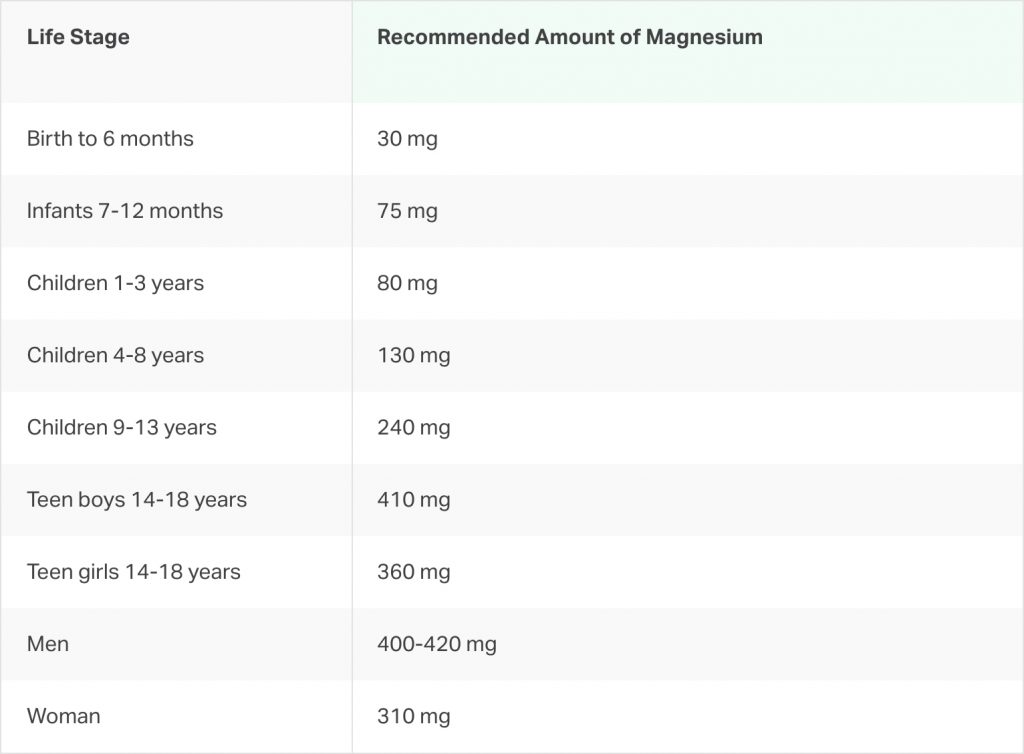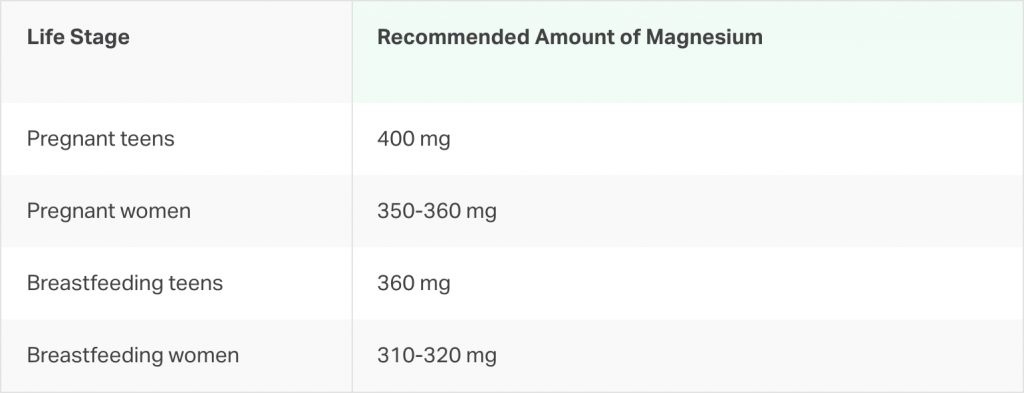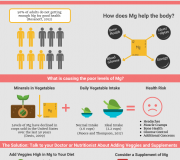 Bookmark
Bookmark Magnesium: Overview of An Essential Nutrient
What is Magnesium?
Magnesium (Mg) is an essential nutrient for human health. Deficiencies in magnesium increase the risk for serious chronic diseases. A healthy diet rich in magnesium and/or supplementation with magnesium can improve health status and reduce risk of chronic illnesses. Unfortunately, current evidence indicates that half or more of Americans currently have some degree of subclinical magnesium deficiency. Increasing magnesium intake could be accomplished with the consumption of adequate amounts of nutritious whole foods (unrefined grains, vegetables, fruits, nuts) and reduced intake of refined or processed foods. For many people, the addition of a magnesium supplement may be required to replete magnesium stores and maintain healthy magnesium levels over the long term.
How Much Magnesium Should You Have?
The National Institutes of Health (NIH) Office of Dietary Supplements recommends the following magnesium intakes for people in various life stages:

How much magnesium should you have?
Magnesium and Pregnancy
Studies show that magnesium may reduce the risk of fetal growth restriction and preeclampsia and increase birth weight. The National Institutes of Health (NIH) Office of Dietary Supplements recommends the following magnesium intakes for pregnant women:

Can you take magnesium while pregnant?
Foods Rich in Magnesium
Whole foods offer unique access to essential nutrients, like magnesium, which work with other nutrients, vitamins and minerals, and phytonutrients to effectively support body systems.
Food sources of magnesium include:
- Nuts and seeds
- Legumes
- Produce
- Whole grains
- Dairy
- Seafood
- Meat
Magnesium Supplements
Plant-based magnesium supplements such as those produced from plants rich in magnesium provide naturally occurring sources of magnesium. Why use plant-based supplements to enrich your diet? First, the Standard American Diet (SAD) lacks sufficient levels of many essential nutrients, magnesium included. Supplemental magnesium can help people deficient in the nutrient to achieve a healthier magnesium status.
Compared to food alone, the addition of dietary supplements significantly increases intake of nutrients, including magnesium, and reduces nutrient inadequacies in adults.
Forms of Magnesium Supplements
Magnesium supplements are available in a variety of forms, and different forms vary in how much elemental magnesium they contain and how well that magnesium is absorbed.
A few studies have shown that some magnesium forms are absorbed more completely and are more bioavailable.
What is magnesium citrate?
Magnesium citrate is one form of magnesium delivery where elemental magnesium is bound to citrate, a derivative of citric acid that is naturally found in citrus fruits.
What is magnesium aspartate?
Magnesium aspartate is one form of magnesium delivery where elemental magnesium is bound to aspartic acid, an amino acid involved in protein biosynthesis.
What is magnesium lactate?
Magnesium lactate is one form of magnesium delivery where elemental magnesium is bound to lactic acid, an organic acid.
What is magnesium chloride?
Magnesium chloride is one form of magnesium delivery where elemental magnesium is bound to chloride, a negatively charged ion formed from elemental chlorine.
Some magnesium forms might have poor bioavailability, such as:
- Oxide
- Sulfate
More on magnesium forms and absorption.
Other forms of magnesium:
- Hydroxide
- Esomeprazole
- Stearate
- Fluoride
- Gluconate
- Chelated
- Nitrate
- Malate
- Threonate
- Phosphate
- Calcium
- Taurate
- Bromide
Magnesium Deficiency
Magnesium is under-consumed by most Americans. Experts estimate that about half of the U.S. population consumes less than the recommended daily amount (RDA) of magnesium. The estimated severity of magnesium deficits has led some experts to suggest that many people need at least 300 milligrams of magnesium per day to replete and maintain body stores.
Hidden or subclinical magnesium deficiencies are especially concerning, as they appear to be common, are difficult to diagnose, and may contribute to a wide range of chronic health problems.
What Causes Magnesium Deficiency to Be So Common?
With declining nutrient content in foods and broad consumption of SAD-style diets, deficiencies in essential nutrients such as magnesium have become extremely common.
The main factors underlying reduced magnesium intake are the declining nutrient content of produce and refined grains and increased consumption of processed foods, both of which are common in the Standard American Diet (SAD). Aging is associated with a higher risk for magnesium deficiency due to age-related changes in diet, intestinal absorption, and renal function.
What Are the Symptoms of Low Magnesium?
Some health conditions that are associated with magnesium intake include:
- Bone disease
- Depression
- Heart failure
- Hypertension
- Kidney disease
- Metabolic syndrome
- Migraine
- Stroke
- Type 2 diabetes
Magnesium Health Benefits & Uses
Magnesium is used for energy production, DNA and RNA synthesis, muscle contraction and relaxation, and much more. Higher dietary magnesium intake has been linked to reduced risk for major diseases, reduced stress and depression, and improved migraine symptoms. Higher dietary intake has also been associated with increased fat-free mass (i.e., skeletal muscle), reduced risk for frailty, improved grip strength and bone density, and reduced risk of mortality due to liver disease. Adequate magnesium status may support healthy aging not only by reducing risk for the multiple diseases described above, but also by preserving chromosomal function.
Magnesium: Frequently Asked Questions
How long does magnesium take to work?
Different forms of magnesium are absorbed at different rates. About 25 to 75 percent of dietary magnesium is absorbed – specific absorption rate depends on an individual’s magnesium status, gastrointestinal (GI) health and dose.
What is magnesium?
Magnesium is an essential nutrient, the fourth most abundant cation in the human body. It enables key metabolic processes, contributes to bone strength, and acts as a cofactor in hundreds of enzymatic reactions.
Can you take too much magnesium?
While uncommon, but possible, intake of too much magnesium can lead to digestive issues and irregular heartbeat, among other health concerns. The proposed normal range for serum magnesium is approximately 1.7 to 2.2 mg/dL. For most adults, the tolerable upper intake level (UL) for supplemental magnesium is 350 mg. The RDA (recommended daily allowance) and EAR (estimated average requirement) to maintain healthy levels of magnesium vary based on age, sex, and reproductive status.
How much magnesium is in a banana?
According to the USDA, one medium (118 g) banana contains 32 mg of magnesium, which equals 10% of the recommended amount per day for an average woman and 8% for an average male.
References
- Grober U, Schmidt J, Kisters K. Magnesium in Prevention and Therapy. Nutrients. Sep 23 2015;7(9):8199-8226.
- Volpe SL. Magnesium in disease prevention and overall health. Adv Nutr. May 1 2013;4(3):378S-383S.
- Rosique-Esteban N, Guasch-Ferre M, Hernandez-Alonso P, Salas-Salvado J. Dietary Magnesium and Cardiovascular Disease: A Review with Emphasis in Epidemiological Studies. Nutrients. Feb 1 2018;10(2).
- Elin RJ. Assessment of magnesium status for diagnosis and therapy. Magnes Res. Dec 2010;23(4):S194-198.
- Quann EE, Fulgoni VL, 3rd, Auestad N. Consuming the daily recommended amounts of dairy products would reduce the prevalence of inadequate micronutrient intakes in the United States: diet modeling study based on NHANES 2007-2010. Nutr J. Sep 4 2015;14:90.
- Moshfegh AG, Goldman J, Ahuja J, Rhodes D, LaComb R. What We Eat in America, NHANES 2005-2006: Usual Nutrient Intakes from Food and Water Compared to 1997 Dietary Reference Intakes for Vitamin D, Calcium, Phosphorus, and Magneisum. . Washington, DC: U.S. Department of Agriculture, Agriculture Research Service;2009.
- Wang JL, Shaw NS, Yeh HY, Kao MD. Magnesium status and association with diabetes in the Taiwanese elderly. Asia Pac J Clin Nutr. 2005;14(3):263-269.
- Olza J, Aranceta-Bartrina J, Gonzalez-Gross M, et al. Reported Dietary Intake, Disparity between the Reported Consumption and the Level Needed for Adequacy and Food Sources of Calcium, Phosphorus, Magnesium and Vitamin D in the Spanish Population: Findings from the ANIBES Study. Nutrients. Feb 21 2017;9(2).
- Costello RB, Elin RJ, Rosanoff A, et al. Perspective: The Case for an Evidence-Based Reference Interval for Serum Magnesium: The Time Has Come. Adv Nutr. Nov 2016;7(6):977-993.
- Vormann J. Magnesium: nutrition and metabolism. Mol Aspects Med. Feb-Jun 2003;24(1-3):27-37.
- Jahnen-Dechent W, Ketteler M. Magnesium basics. Clin Kidney J. Feb 2012;5(Suppl 1):i3-i14.
- Rude RK, Gruber HE. Magnesium deficiency and osteoporosis: animal and human observations. J Nutr Biochem. Dec 2004;15(12):710-716.
- Nielsen FH, Milne DB, Gallagher S, Johnson L, Hoverson B. Moderate magnesium deprivation results in calcium retention and altered potassium and phosphorus excretion by postmenopausal women. Magnes Res. Mar 2007;20(1):19-31.
- Schwalfenberg GK, Genuis SJ. The Importance of Magnesium in Clinical Healthcare. Scientifica (Cairo). 2017;2017:4179326.
- Hermes Sales C, Azevedo Nascimento D, Queiroz Medeiros AC, Costa Lima K, Campos Pedrosa LF, Colli C. There is chronic latent magnesium deficiency in apparently healthy university students. Nutr Hosp. Jul 1 2014;30(1):200-204.
- Elin RJ. Re-evaluation of the concept of chronic, latent, magnesium deficiency. Magnes Res. Dec 2011;24(4):225-227.
- Mejia-Rodriguez F, Shamah-Levy T, Villalpando S, Garcia-Guerra A, Mendez-Gomez Humaran I. Iron, zinc, copper and magnesium deficiencies in Mexican adults from the National Health and Nutrition Survey 2006. Salud Publica Mex. May-Jun 2013;55(3):275-284.
- DiNicolantonio JJ, O’Keefe JH, Wilson W. Subclinical magnesium deficiency: a principal driver of cardiovascular disease and a public health crisis. Open Heart. 2018;5(1):e000668.
- Kunutsor SK, Whitehouse MR, Blom AW, Laukkanen JA. Low serum magnesium levels are associated with increased risk of fractures: a long-term prospective cohort study. Eur J Epidemiol. Jul 2017;32(7):593-603.
- Orchard TS, Larson JC, Alghothani N, et al. Magnesium intake, bone mineral density, and fractures: results from the Women’s Health Initiative Observational Study. Am J Clin Nutr. Apr 2014;99(4):926-933.
- Rude RK, Singer FR, Gruber HE. Skeletal and hormonal effects of magnesium deficiency. J Am Coll Nutr. Apr 2009;28(2):131-141.
- Mahdavi-Roshan M, Ebrahimi M, Ebrahimi A. Copper, magnesium, zinc and calcium status in osteopenic and osteoporotic post-menopausal women. Clin Cases Miner Bone Metab. Jan-Apr 2015;12(1):18-21.
- Szkup M, Jurczak A, Brodowska A, et al. Analysis of Relations Between the Level of Mg, Zn, Ca, Cu, and Fe and Depressiveness in Postmenopausal Women. Biol Trace Elem Res. Mar 2017;176(1):56-63.
- Rajizadeh A, Mozaffari-Khosravi H, Yassini-Ardakani M, Dehghani A. Effect of magnesium supplementation on depression status in depressed patients with magnesium deficiency: A randomized, double-blind, placebo-controlled trial. Nutrition. Mar 2017;35:56-60.
- Taveira TH, Ouellette D, Gulum A, et al. Relation of Magnesium Intake With Cardiac Function and Heart Failure Hospitalizations in Black Adults: The Jackson Heart Study. Circ Heart Fail. Apr 2016;9(4):e002698.
- Fang X, Wang K, Han D, et al. Dietary magnesium intake and the risk of cardiovascular disease, type 2 diabetes, and all-cause mortality: a dose-response meta-analysis of prospective cohort studies. BMC Med. Dec 8 2016;14(1):210.
- Han H, Fang X, Wei X, et al. Dose-response relationship between dietary magnesium intake, serum magnesium concentration and risk of hypertension: a systematic review and meta-analysis of prospective cohort studies. Nutr J. May 5 2017;16(1):26.
- Dibaba DT, Xun P, Song Y, Rosanoff A, Shechter M, He K. The effect of magnesium supplementation on blood pressure in individuals with insulin resistance, prediabetes, or noncommunicable chronic diseases: a meta-analysis of randomized controlled trials. Am J Clin Nutr. Sep 2017;106(3):921-929.
- Zhang X, Li Y, Del Gobbo LC, et al. Effects of Magnesium Supplementation on Blood Pressure: A Meta-Analysis of Randomized Double-Blind Placebo-Controlled Trials. Hypertension. Aug 2016;68(2):324-333.
- Rebholz CM, Tin A, Liu Y, et al. Dietary Magnesium and Kidney Function Decline: The Healthy Aging in Neighborhoods of Diversity across the Life Span Study. Am J Nephrol. 2016;44(5):381-387.
- Sarrafzadegan N, Khosravi-Boroujeni H, Lotfizadeh M, Pourmogaddas A, Salehi-Abargouei A. Magnesium status and the metabolic syndrome: A systematic review and meta-analysis. Nutrition. Apr 2016;32(4):409-417.
- He K, Liu K, Daviglus ML, et al. Magnesium intake and incidence of metabolic syndrome among young adults. Circulation. Apr 4 2006;113(13):1675-1682.
- Hruby A, Meigs JB, O’Donnell CJ, Jacques PF, McKeown NM. Higher magnesium intake reduces risk of impaired glucose and insulin metabolism and progression from prediabetes to diabetes in middle-aged americans. Diabetes Care. Feb 2014;37(2):419-427.
- Simental-Mendia LE, Sahebkar A, Rodriguez-Moran M, Guerrero-Romero F. A systematic review and meta-analysis of randomized controlled trials on the effects of magnesium supplementation on insulin sensitivity and glucose control. Pharmacol Res. Sep 2016;111:272-282.
- Tarighat Esfanjani A, Mahdavi R, Ebrahimi Mameghani M, Talebi M, Nikniaz Z, Safaiyan A. The effects of magnesium, L-carnitine, and concurrent magnesium-L-carnitine supplementation in migraine prophylaxis. Biol Trace Elem Res. Dec 2012;150(1-3):42-48.
- Adebamowo SN, Spiegelman D, Willett WC, Rexrode KM. Association between intakes of magnesium, potassium, and calcium and risk of stroke: 2 cohorts of US women and updated meta-analyses. Am J Clin Nutr. Jun 2015;101(6):1269-1277.
- Fang X, Han H, Li M, et al. Dose-Response Relationship between Dietary Magnesium Intake and Risk of Type 2 Diabetes Mellitus: A Systematic Review and Meta-Regression Analysis of Prospective Cohort Studies. Nutrients. Nov 19 2016;8(11).
- Hruby A, Guasch-Ferre M, Bhupathiraju SN, et al. Magnesium Intake, Quality of Carbohydrates, and Risk of Type 2 Diabetes: Results From Three U.S. Cohorts. Diabetes Care. Dec 2017;40(12):1695-1702.
- Guerrero-Romero F, Simental-Mendia LE, Hernandez-Ronquillo G, Rodriguez-Moran M. Oral magnesium supplementation improves glycaemic status in subjects with prediabetes and hypomagnesaemia: A double-blind placebo-controlled randomized trial. Diabetes Metab. Jun 2015;41(3):202-207.
- Hayhoe RPG, Lentjes MAH, Mulligan AA, Luben RN, Khaw KT, Welch AA. Cross-sectional associations of dietary and circulating magnesium with skeletal muscle mass in the EPIC-Norfolk cohort. Clin Nutr. Jan 30 2018.
- Veronese N, Stubbs B, Maggi S, et al. Dietary Magnesium and Incident Frailty in Older People at Risk for Knee Osteoarthritis: An Eight-Year Longitudinal Study. Nutrients. Nov 16 2017;9(11).
- Welch AA, Skinner J, Hickson M. Dietary Magnesium May Be Protective for Aging of Bone and Skeletal Muscle in Middle and Younger Older Age Men and Women: Cross-Sectional Findings from the UK Biobank Cohort. Nutrients. Oct 30 2017;9(11).
- Wu L, Zhu X, Fan L, et al. Magnesium intake and mortality due to liver diseases: Results from the Third National Health and Nutrition Examination Survey Cohort. Sci Rep. Dec 20 2017;7(1):17913.
- 44.Wakimoto P, Block G. Dietary intake, dietary patterns, and changes with age: an epidemiological perspective. J Gerontol A Biol Sci Med Sci. Oct 2001;56 Spec No 2:65-80.
- Killilea DW, Maier JA. A connection between magnesium deficiency and aging: new insights from cellular studies. Magnes Res. Jun 2008;21(2):77-82.
- Lin J, Epel E, Blackburn E. Telomeres and lifestyle factors: roles in cellular aging. Mutat Res. Feb 1 2012;730(1-2):85-89.
- Mazidi M, Kengne AP, Banach M. Mineral and vitamin consumption and telomere length among adults in the United States. Pol Arch Intern Med. Feb 2 2017;127(2):87-90.
- Shah NC, Shah GJ, Li Z, Jiang XC, Altura BT, Altura BM. Short-term magnesium deficiency downregulates telomerase, upregulates neutral sphingomyelinase and induces oxidative DNA damage in cardiovascular tissues: relevance to atherogenesis, cardiovascular diseases and aging. Int J Clin Exp Med. 2014;7(3):497-514.
- National Institutes of Health, US National Library of Medicine. Magnesium blood test. 2018; Available at: https://medlineplus.gov/ency/article/003487.htm.
- Institute of Medicine, Food and Nutrition Board. Dietary Reference Intakes: Calcium, Phosphorus, Magnesium, Vitamin D and Fluoride. Washington, DC: National Academy Press;1997.
- National Institutes of Health, Office of Dietary Supplements. Magnesium. 2018; Available at: https://ods.od.nih.gov/FactSheets/magnesium/.
- US Department of Health and Human Services, US Department of Agriculture. Dietary guidelines for Americans 2015-2020, 8th ed. 2015; Available at: https://health.gov/dietaryguidelines/2015/guidelines/.
- US Department of Agriculture. USDA National Nutrient Database for Standard Reference Release 28. 2015; Available at: https://www.ars.usda.gov/northeast-area/beltsville-md/beltsville-human-nutrition-research-center/nutrient-data-laboratory/docs/usda-national-nutrient-database-for-standard-reference/.
- Rehm CD, Drewnowski A. Replacing American snacks with tree nuts increases consumption of key nutrients among US children and adults: results of an NHANES modeling study. Nutr J. Mar 7 2017;16(1):17.
- Papanikolaou Y, Jones JM, Fulgoni VL, 3rd. Several grain dietary patterns are associated with better diet quality and improved shortfall nutrient intakes in US children and adolescents: a study focusing on the 2015-2020 Dietary Guidelines for Americans. Nutr J. Feb 20 2017;16(1):13.
- O’Neil CE, Nicklas TA, Fulgoni VL, DiRienzo MA. Cooked oatmeal consumption is associated with better diet quality, better nutrient intakes, and reduced risk for central adiposity and obesity in children 2-18 years: NHANES 2001-2010. Food Nutr Res. 2015;59:26673.
- O’Donovan CB, Devlin NF, Buffini M, et al. Whole grain intakes in Irish adults: findings from the National Adults Nutrition Survey (NANS). Eur J Nutr. Jan 20 2018.
- Martinez Steele E, Popkin BM, Swinburn B, Monteiro CA. The share of ultra-processed foods and the overall nutritional quality of diets in the US: evidence from a nationally representative cross-sectional study. Popul Health Metr. Feb 14 2017;15(1):6.
- Thomas D. The mineral depletion of foods available to us as a nation (1940-2002)–a review of the 6th Edition of McCance and Widdowson. Nutr Health. 2007;19(1-2):21-55.
- Guo W, Nazim H, Liang Z, al. E. Magnesium deficiency in plants: an urgent problem. Crop J. 2016;4:83-91.
- Broadley MR, White PJ. Eats roots and leaves. Can edible horticultural crops address dietary calcium, magnesium and potassium deficiencies? Proc Nutr Soc. Nov 2010;69(4):601-612.
- Blumberg JB, Frei B, Fulgoni VL, Weaver CM, Zeisel SH. Contribution of Dietary Supplements to Nutritional Adequacy in Various Adult Age Groups. Nutrients. Dec 6 2017;9(12).
- Allaert FA, Courau S, Forestier A. Effect of magnesium, probiotic, and vitamin food supplementation in healthy subjects with psychological stress and evaluation of a persistent effect after discontinuing intake. Panminerva Med. Dec 2016;58(4):263-270.
- Tarleton EK, Littenberg B, MacLean CD, Kennedy AG, Daley C. Role of magnesium supplementation in the treatment of depression: A randomized clinical trial. PLoS One. 2017;12(6):e0180067.
- US Department of Agriculture, Agricultural Research Service. Nutrient intakes from food: Mean amounts consumed per individual, one day, 2005-2006. 2008; Available at: https://www.ars.usda.gov/northeast-area/beltsville-md/beltsville-human-nutrition-research-center/food-surveys-research-group/.















